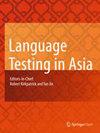Models of assessment in the classroom: a comparative research of CALL-based vs. traditional assessment on vocabulary learning among Iranian EFL learners
IF 2.5
1区 文学
Q1 EDUCATION & EDUCATIONAL RESEARCH
引用次数: 0
Abstract
Abstract There are a few empirical studies on comparative effects of CALL-based assessment and traditional assessment on Iranian EFL students’ vocabulary learning; therefore, the present research tried to fill this gap. To achieve this purpose, the NELT was administered to 89 EFL students, and 58 of them whose level of English proficiency was the intermediate were chosen for the target sample of the current research. Then, they were randomly divided into two groups of control and experimental, and a vocabulary pre-test was given to them. Next, the experimental group (EG) received a CALL-based assessment treatment, and the control group (CG) received a traditional-based assessment instruction. After instructing 100 new words to both groups, a vocabulary post-test was conducted, and an ANCOVA test and a paired samples t -test were utilized to analyze the scores of the pre- and post-tests. The gained outcomes indicated that the EG outstripped the CG on the post-test of vocabulary. It was concluded that using the CALL-based assessment was more useful than the conventional assessment for learning English vocabulary items. The research findings can be beneficial for EFL teachers, learners, and curriculum designers.课堂评价模式:基于call与传统的伊朗英语学习者词汇学习评价的比较研究
基于call的评价与传统评价对伊朗英语学生词汇学习效果的比较研究较少;因此,本研究试图填补这一空白。为了达到这一目的,我们对89名英语学生进行了NELT测试,其中58名英语水平为中等水平的学生被选为本研究的目标样本。然后,将他们随机分为对照组和实验组两组,对他们进行词汇预测。接下来,实验组(EG)接受基于call的评估治疗,对照组(CG)接受基于传统的评估指导。在向两组学生讲授100个新单词后,进行词汇后测,采用ANCOVA检验和配对样本t检验对前测和后测结果进行分析。结果表明,在词汇后测中,EG优于CG。结果表明,在英语词汇学习中,使用基于call的评价方法比使用传统的评价方法更有效。研究结果对英语教师、学习者和课程设计者都是有益的。
本文章由计算机程序翻译,如有差异,请以英文原文为准。
求助全文
约1分钟内获得全文
求助全文
来源期刊

Language Testing in Asia
Arts and Humanities-Language and Linguistics
CiteScore
4.00
自引率
28.60%
发文量
50
 求助内容:
求助内容: 应助结果提醒方式:
应助结果提醒方式:


